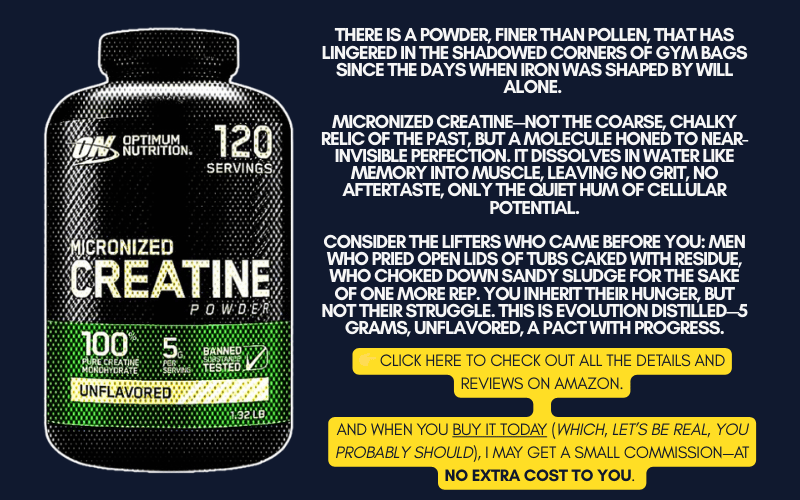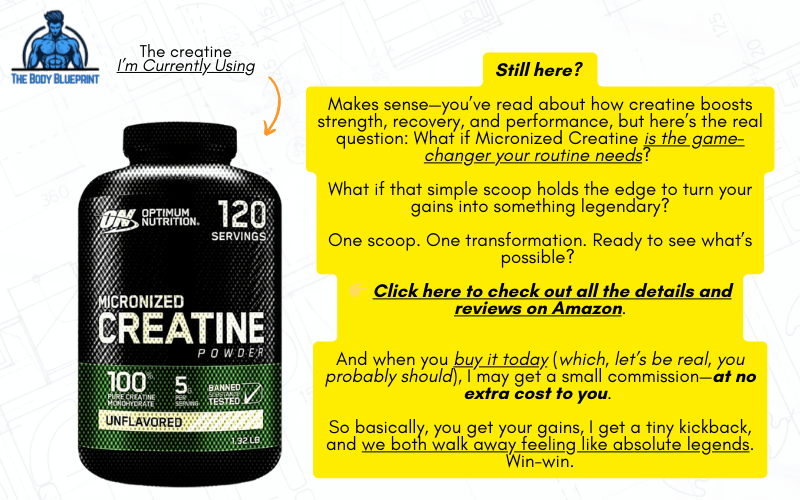Picture this: A 1990s gold’s gym, chalk dust hanging in neon-lit air. A young Dorian Yates slams 500 pounds onto his back, veins mapping his skin like rivers. Nearby, a faded tub of creatine monohydrate sits cracked on a bench. Fast-forward three decades. Chris Bumstead, Mr. Olympia, sips a shaker of the same unassuming powder. The message is clear: creatine isn’t a trend—it’s a titan.
Here’s why you care:
Creatine supercharges ATP (your muscles’ jet fuel), amps strength gains by 15%, and sharpens your brain. It’s been the quiet edge for bodybuilders from Arnold’s era to today’s giants. No hype. Just cellular alchemy.
The Science of More: How Creatine Fuels the Grind
Your muscles scream during that final rep. That burn? It’s ATP depletion—the moment your body screams “enough!” Enter creatine. Stored as phosphocreatine, it donates phosphate groups to ADP, resurrecting ATP in 30 seconds flat.
ATP With vs. Without Creatine
| Scenario | ATP Regeneration | Max Effort Duration |
|---|---|---|
| No Creatine | Slower | 10-15 seconds |
| With Creatine Loading | 3x Faster | 20-30 seconds |
“Creatine isn’t a supplement—it’s a metabolic cheat code,” says Eugene Thong, CSCS. “You’re not just lifting heavier. You’re redefining your ceiling.”
The Bodybuilder’s Trinity: Strength, Size, Stamina
- Strength: Studies show 8% stronger bench presses in 4 weeks. Not magic—phosphagen system optimization.
- Hypertrophy: Creatine pulls water into muscle cells, triggering growth signals. Think of it as muscle memory on steroids.
- Recovery: Faster ATP recycling = shorter rest between sets. More volume. More gains.

The Unseen Edge: Brain Gains & the Cognitive Lifeline
Here’s the twist: Your brain burns 20% of your ATP. Phosphocreatine isn’t just for biceps.
Charles Damiano, B.S. Clinical Nutrition, puts it bluntly: “Low brain creatine? You’re grinding in fog. Optimal levels? Laser focus—like swapping dial-up for fiber-optic.”
Unexpected Benefits (No One Talks About)
- Neuroprotection: Shields neurons from glutamate toxicity.
- Mood Boost: Elevates prefrontal cortex dopamine.
- Aging Defense: Fights sarcopenia and cognitive decline.
The Golden Protocol: Timing, Dosage, Legacy
Phase 1 (Day 1-5): 20g/day split (5g x4) to saturate muscles.
Phase 2 (Day 6+): 3-5g daily. No cycling needed.
Q&A: Creatine’s Hidden Corners – Rare Quirks & Uncommon Truths
A: Yes – and it’s tied to your muscle fiber type and satellite cell activity. Roughly 20-30% of people see muted gains, often linked to low baseline muscle creatine or slow-transporting SLC6A8 gene variants.
Eugene Thong, CSCS: “If you’re a non-responder, double your water intake. Hydration unlocks cellular uptake – sometimes, it’s that simple.”
A: Zero direct evidence. However, creatine may slightly increase DHT (a hormone linked to hair loss) in genetically prone individuals.
Mitigation: Pair with saw palmetto or pumpkin seed oil. Charles Damiano: “Unless you’re clinging to your hairline like a cliffhanger, this is a non-issue. Prioritize gains.”
A: Myth. Creatine pulls water into muscle cells, not under the skin. Post-2010, pros like Jay Cutler used it pre-stage to amplify vascularity.
Pro Tip: Drop sodium instead. “Subcutaneous water isn’t creatine’s fault – it’s your electrolyte game,” says Thong.
A: Creatine has zero calories and doesn’t spike insulin. Damiano: “It’s fasting-friendly. Think of it as a cellular shield while you’re in deficit mode.”
Bonus: Studies suggest it may enhance autophagy in brain cells when fasted.
A: No upper limit is proven, but 5g/day is the Goldilocks zone. Excess is flushed via kidneys.
Thong’s take: “The only overdose is paranoia. Humans naturally produce 1-2g daily – adding 3-5g is like topping off a gas tank.”
A: Emerging research shows creatine upregulates collagen synthesis in connective tissue. Bodybuilders in the ‘90s reported fewer pec tears – anecdotally.
Actionable: Pair with vitamin C for collagen synergy. Damiano: “Your tendons are 30% collagen. Feed them.”
A: Water retention can add 2-4lbs of scale weight, bumping you into a higher weight class. It’s a tactical move, not a performance issue.
Pro Hack: Drop creatine 7 days pre-meet if you’re on the class borderline. “Water weight is negotiable. Strength isn’t,” says Thong.

The Final Rep
Creatine isn’t about shortcuts. It’s about honoring the grind with every gram of science you can wield. From the Golden Era’s iron temples to your garage gym, it’s the thread stitching generations of lifters together.
As Thong says: “The difference between good and legendary? Sometimes, it’s just 5 grams.”
